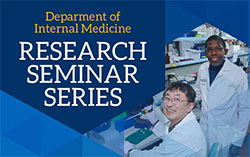For those of us who practice in academic medical centers and who conduct biomedical research, recent news from Washington, D.C., is cause for concern. The proposed presidential budget proposal indicated that as much as 20 percent, or approximately $6 billion, could be cut from the NIH budget, and a $1.2B reduction was proposed for the 2017 budget, which is yet to be passed. Although it is up to Congress to ultimately determine budgets for Federal research programs, for which there has always been strong bipartisan support, it is clear that we will need to brace ourselves for a challenging funding environment. While it remains essential for all of us to advocate directly and through our professional societies with our elected officials regarding the importance of advancing biomedical discovery and clinical innovation, it is also important for the Department of Internal Medicine to realign its priorities to increase our competitiveness for what may be an environment faced with declining resources.
We are all in this together. The Department is developing peer groups organized by research theme, with a goal of ensuring that all investigators submitting grants receive rigorous feedback and peer review prior to grant submission. I recognize that this will take time and sacrifice, but the reality is that only exceptional grant proposals will be funded. In this regard, I can share the results of my personal commitment: I read four grants from colleagues over the past month and hope that I provided meaningful feedback and input. I would encourage more of us to do the same.
 We must also improve the way that we mentor and support our junior faculty. It is not enough to talk about the “promise” or the “potential” of our junior colleagues, it has become even more imperative for those of us who have tasted success in our research endeavors to actively transmit our experience and expertise to those who follow behind us. If we do not ensure that all our colleagues know, for example, how to tell the most compelling stories in their grant applications or to refer them to external sources that are best suited for their interests, we run the risk of squandering the Department’s resources that we invest to develop our talent pool. The Department is also working to improve lists of available resources through our updated website, providing up-to-date information about funding opportunities, particularly those targeted to junior colleagues.
We must also improve the way that we mentor and support our junior faculty. It is not enough to talk about the “promise” or the “potential” of our junior colleagues, it has become even more imperative for those of us who have tasted success in our research endeavors to actively transmit our experience and expertise to those who follow behind us. If we do not ensure that all our colleagues know, for example, how to tell the most compelling stories in their grant applications or to refer them to external sources that are best suited for their interests, we run the risk of squandering the Department’s resources that we invest to develop our talent pool. The Department is also working to improve lists of available resources through our updated website, providing up-to-date information about funding opportunities, particularly those targeted to junior colleagues.
Investing as much of ourselves as we can in productive mentoring relationships aligns with our core institutional mission. Thus, I also derive a great deal of satisfaction seeing and celebrating our trainees’ successes. In this vein, I am pleased to report that Dr. Mahmoud Abou Alaiwa, an Assistant Professor of Pulmonary, Critical Care, and Occupational Medicine, was recently awarded a K08, a career development award from the National Institutes of Health. He joined this institution in 2010 as a Fellow in Pulmonary Medicine and has steadily built a series of research successes and publications while working under the mentorship of Drs. David Stoltz, Joe Zabner, and Michael Welsh. Dr. Abou Alaiwa is continuing his research into the causes of and treatments for cystic fibrosis. His current work, with Dr. Welsh as his mentor, will examine the effects of a variety of agents on airway mucus, with the ultimate goal of reducing airway mucus viscosity. (You can read more about the research here.) Congratulations to Dr. Abou Alaiwa and to those senior faculty members who have guided him thus far in his career development.
 Building collaborations by creating an increasingly matrixed research community has also become more important. To facilitate this goal, the Department remains committed to promoting and supporting forums that increase our understanding of the breadth of research in our Department. Based upon consultation and feedback from our community, we launched the Department’s Research Seminar Series earlier this month. I was pleased by the turnout and have heard from the presenters and the attendees that the novel format, which encourages attendee questions and dialogue, was a good way to generate ideas and fresh perspectives. I invite you to our second session in this series, which will be held in the HP Smith Conference Room (W256 GH) at 4:30 on Tuesday, April 4. Dr. Alejandro Comellas will present “Air Pollution and Respiratory Infections: a ‘Wicked’ Problem” and Dr. Chad Grueter will present “Transcriptional Regulation of Cardiac Metabolism.” Both presentations promise to be engaging glimpses into cutting-edge research, even for those outside these subspecialties. We hope you will join us. I will be traveling to Columbia University to give a named lecture that day, but I will be there in spirit.
Building collaborations by creating an increasingly matrixed research community has also become more important. To facilitate this goal, the Department remains committed to promoting and supporting forums that increase our understanding of the breadth of research in our Department. Based upon consultation and feedback from our community, we launched the Department’s Research Seminar Series earlier this month. I was pleased by the turnout and have heard from the presenters and the attendees that the novel format, which encourages attendee questions and dialogue, was a good way to generate ideas and fresh perspectives. I invite you to our second session in this series, which will be held in the HP Smith Conference Room (W256 GH) at 4:30 on Tuesday, April 4. Dr. Alejandro Comellas will present “Air Pollution and Respiratory Infections: a ‘Wicked’ Problem” and Dr. Chad Grueter will present “Transcriptional Regulation of Cardiac Metabolism.” Both presentations promise to be engaging glimpses into cutting-edge research, even for those outside these subspecialties. We hope you will join us. I will be traveling to Columbia University to give a named lecture that day, but I will be there in spirit.


I would add, borrowing the words of Samuel Johnson, that the the true measure of a mentor is whether he invests the time, resources and energy to help someone who can do him absolutely no good.